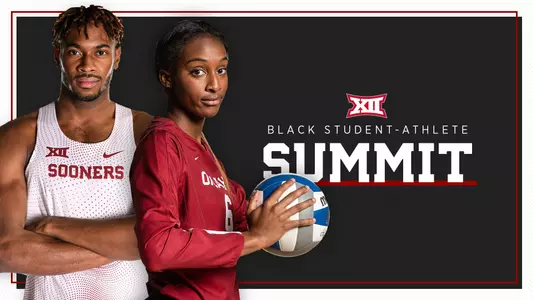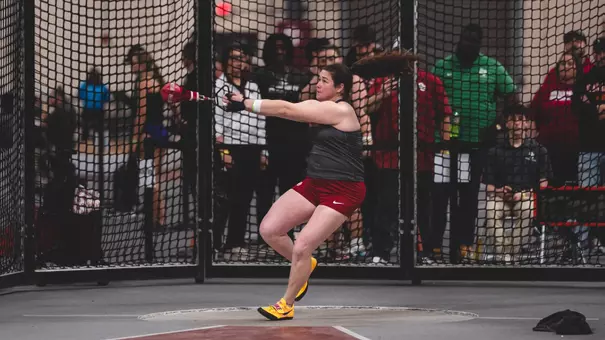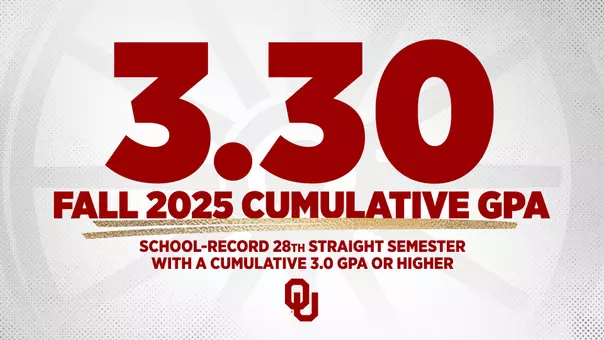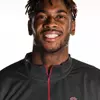University of Oklahoma Athletics

Sooners Recap Black Student-Athlete Summit
February 12, 2021 | Athletics, Track and Field, Volleyball
NORMAN — As part of the University of Oklahoma Athletics Department's Sooners for Humanity initiative, OU track and field redshirt junior Isaiah Levingston and volleyball sophomore Sanaá Dotson (first name pronounced suh-NAY) participated in the Black Student-Athlete Summit in January, an annual event hosted by the University of Texas and this year held virtually due to the COVID-19 pandemic. The three-day summit featured dozens of presenters and an opportunity to network with thought leaders, professionals and other student-athletes.
Organizers of the summit said the aim of this year's event was to ensure that Black student-athletes have the practical leadership skills to be effective change agents on campus and beyond, and to help position them to promote the well-being of themselves, their peers, families and communities.
"Since its inception in 2015, the Black Student-Athlete Summit has been a mecca for support, research and important dialogue centered on the collegiate Black student-athlete experience."
Brenton Sumler
"Since its inception in 2015, the Black Student-Athlete Summit has been a mecca for support, research and important dialogue centered on the collegiate Black student-athlete experience," said OU Director of Student-Athlete Experience and Well-Being Brenton Sumler. "As we continue to strive to provide a championship experience for all of student-athletes here at OU, we knew it was important to provide a few of our influential Black student-athletes the opportunity to attend the important event.
"In selecting our representatives, we wanted to choose student-athletes who have true passion and a voice for not only improving the Black student-athlete experience here at OU but also in the community in which they live. It was a no-brainer to choose Isaiah and Sanaá to represent OU at this important summit."
Levingston and Dotson, who are active and influential members in OU's Athletes United group that strives for a safe space to educate, empower and promote outreach to the community, recap their summit experiences below.
Isaiah Levingston // Jr. // Track & Field
The purpose of the Black Student-Athlete Summit is to enhance the growth and development of Black student-athletes. A primary goal was to ensure that student-athletes recognize/discover their identities outside of athletics; specifically, identities that will help us find a suitable and enjoyable career upon the exhaustion of our eligibility. Well-being was an important theme in each of our breakout sessions. Not only did we learn about well-being practices for ourselves, but also for our friends, families and communities.
In my opinion, one of our most important breakout sessions was about rape culture, and how we unknowingly promote it with outside influences. There were two different groups for this sensitive issue: male and female. I am unsure of what the women discussed in their breakout room, however, I can say that we men collectively became more cognizant of the dangers of the outside influences that promote rape culture. Influences that can come from music, hazing and the desire for social acceptance.
"We hope to use our platform and voice as student-athletes to create the change that we hope to see."
Isaiah Levingston
Another significant takeaway for me is the importance of connectivity. There were professors, lawyers, psychologists, and many other professionals who served as panelists. We were able to ask them questions about their fields of work and what it'll take to achieve success if we choose a similar career path. This taught me the importance of being proactive in figuring out what I want to do after graduation. It is vital for me to have a career plan so that I can make connections with professionals who can offer guidance if I am to ever stumble upon a roadblock in pursuing my career goals.
Lastly, a discussion that I found extremely interesting and noteworthy revolved around how some athletes do not choose their major. Around the nation this seems to be a recurring phenomenon. Some athletic advisors simply place athletes in less arduous degree fields, ones which will not give the athlete ample career opportunities after graduation. As a result, those student-athletes who do not choose their major will unfortunately be in career fields that they might not be passionate about.
Athletes United (AU) is a student-athlete-led organization at OU. This group was created to be a safe space for minority student-athletes, as well as an educational space for white allies, to participate and have a greater sense of understanding about race relations. There are four areas of activity within AU: activism, communication, programming and unifying events. The overarching goal of this group is to create and implement change that completely eradicates racism within the university. We hope to use our platform and voice as student-athletes to create the change that we hope to see.
The knowledge we gained from this summit can be shared using AU's group space and social media platforms. The function of the summit was to educate and inform us on what we can do to enhance the Black student-athlete experience and well-being. AU has very similar initiatives, so this information can be used to enhance the Black student-athlete experience at OU. Topics that we can incorporate into our safe spaces might include: intrapersonal and interpersonal well-being, rape culture and its influences, establishing connections with professionals, choosing the right degree field, etc.
This information can be used to not only improve the Black student-athlete experience at OU, but also to inspire others to attend the summit in the future.
Sanaá Dotson // So. // Volleyball
During the Black Student-Athlete Summit, I had the opportunity to attend several different seminars hosted by distinguished speakers. The seminar subjects varied from how to grow your own brand, how to handle microaggressions, and the importance of being more than an athlete.
I thoroughly enjoyed the wide variety of subjects and the opportunity to connect with many other athletes across the country similar to me.
I loved all of the seminars but one of my favorites was hosted by Jason Ferguson. He held a seminar called "More Than an Athlete." Jason shared his life story surrounding college athletics and football. He endured several injuries and ultimately had to end his career early after a string of poor choices.
As Jason shared his testimony, he harped on the fact that his lowest point was when he connected his worth to his sport. He thought of himself as "Jason Ferguson the football player," not "Jason Ferguson the person."
I feel that Jason's story is important for all young athletes to hear. It made me think more about other things I'm passionate about, and what more I have to offer than just sports. I think it will have a lasting effect on me.
It can be extremely easy for athletes to fall under the impression that sports are their sole purpose and neglect other potential interests. Jason Ferguson left us all with the words, "Be passionate about your sport but don't limit yourself." He encouraged all of us in attendance to add more to our tool belt and try new things.
"The summit encouraged everyone to have the tough and uncomfortable conversations."
Sanaá Dotson
One of my favorite things about the seminar was that there were so many different noteworthy speakers. I attended the seminar of a professional WNBA player. She discussed the importance of new experiences and embracing new cultures. I was able to listen to a lawyer discuss in depth how NIL rules will work. I was able to tune in and hear an LSU professor explain how a culture shift at her University came to be. The best part of it all was that it was 100% interactive. I could ask these distinguished professionals questions and learn from them.
One of the topics also discussed was how to handle being a minority in the minority. The Athletes United group at OU is a great way to connect with athletes from different backgrounds and cultures and creates a safe place for people to share their stories and grow. And the summit encouraged everyone to have the tough and uncomfortable conversations.
I feel that with the knowledge gained by participating in the summit I've learned more about how to educate others and conduct a meaningful conversation about race and similar subjects. Through these conversations, I hope to create a more welcoming haven for minority students.
I hope the seminar has impacted others the way it has impacted me.














